Unit 3 Progress单元语法课件(分词作状语)
文档属性
| 名称 | Unit 3 Progress单元语法课件(分词作状语) |
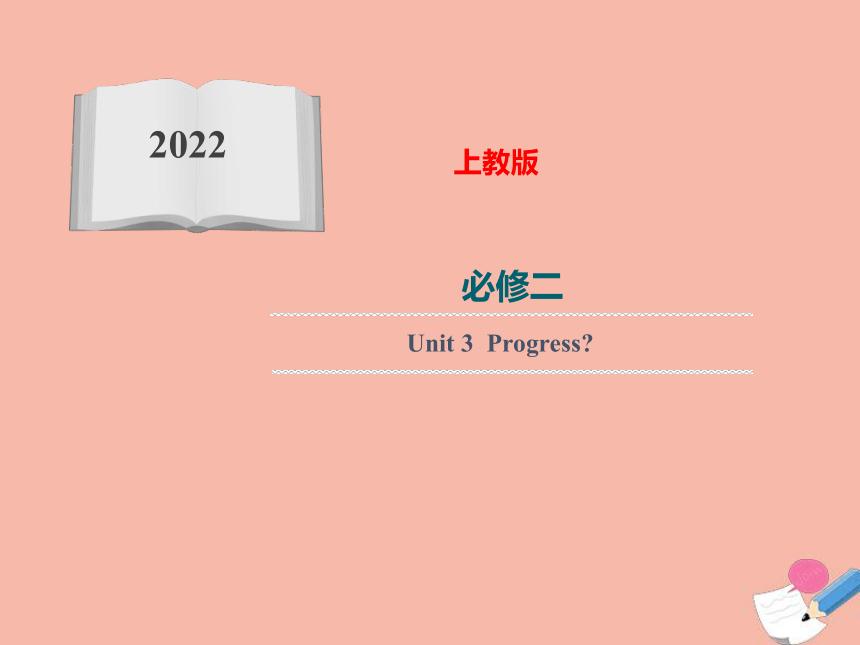
|
|
| 格式 | pptx | ||
| 文件大小 | 679.1KB | ||
| 资源类型 | 试卷 | ||
| 版本资源 | 上教版(2020) | ||
| 科目 | 英语 | ||
| 更新时间 | 2021-10-22 18:00:59 | ||
图片预览

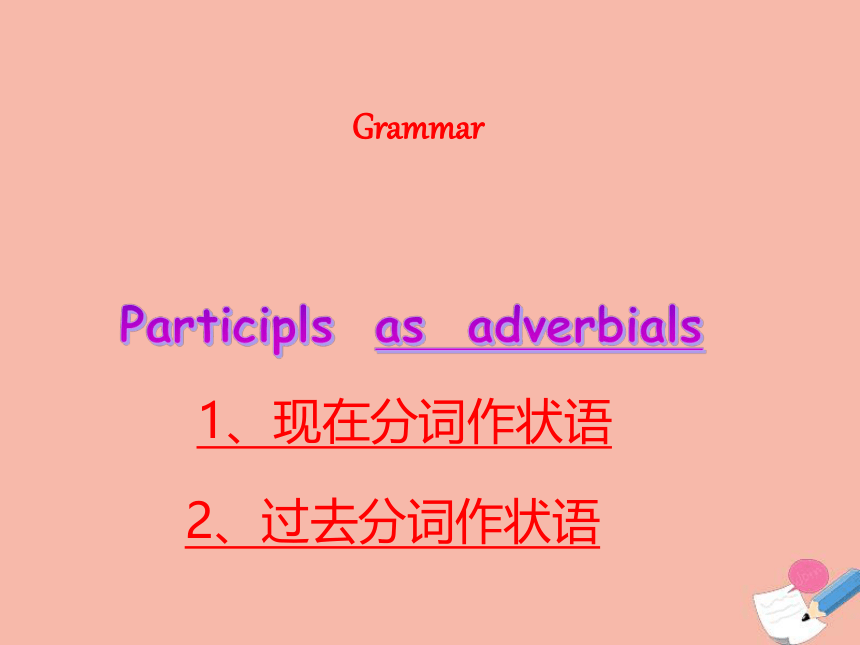

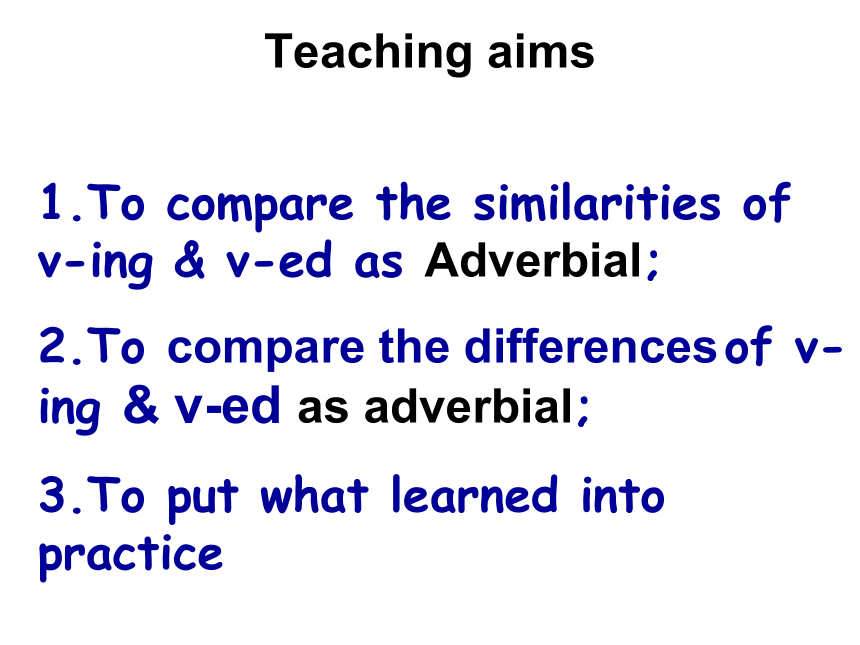
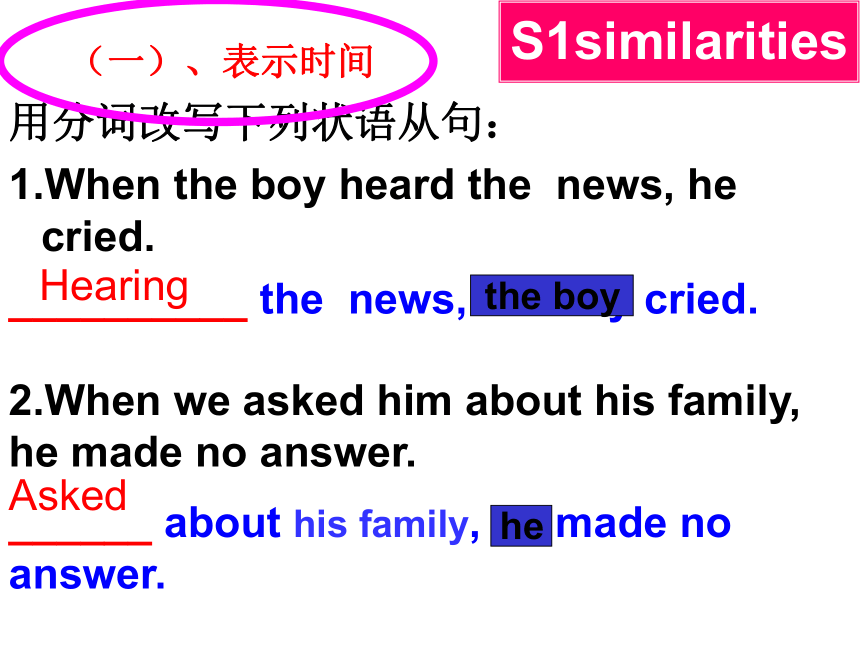
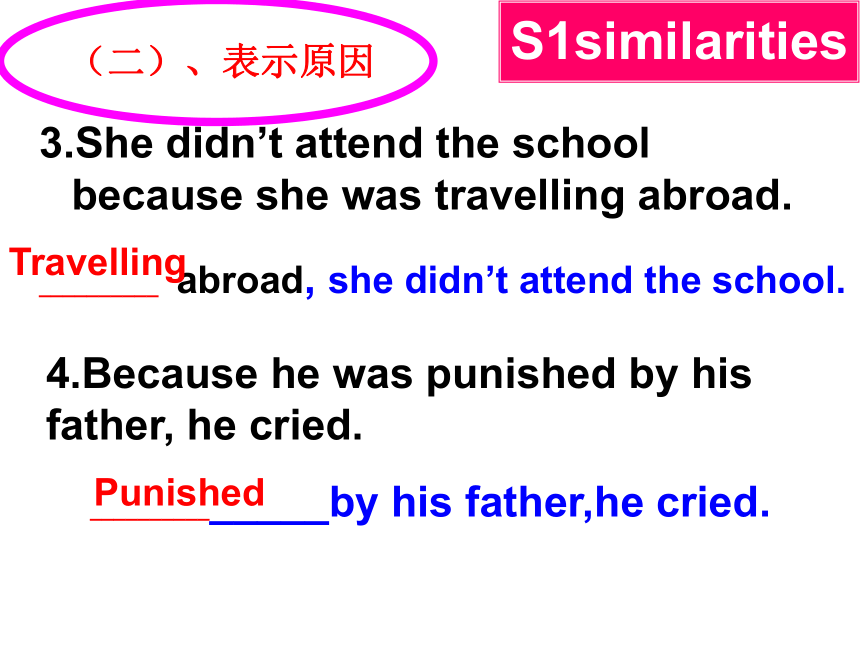
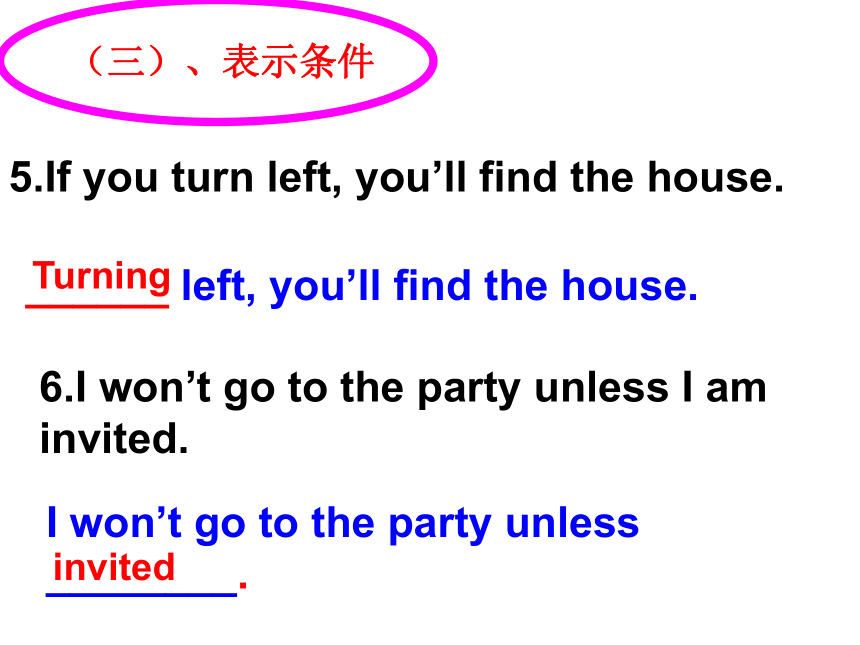
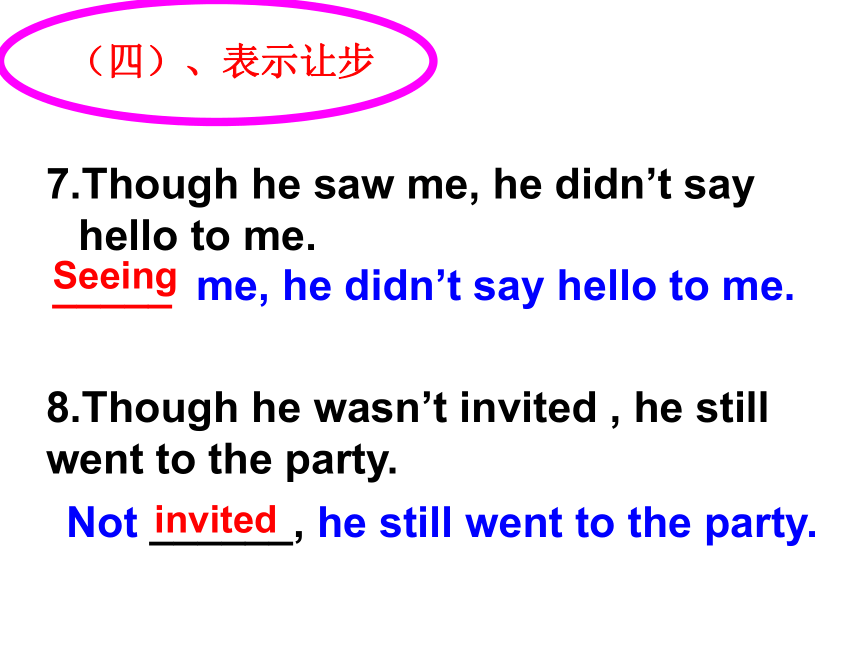
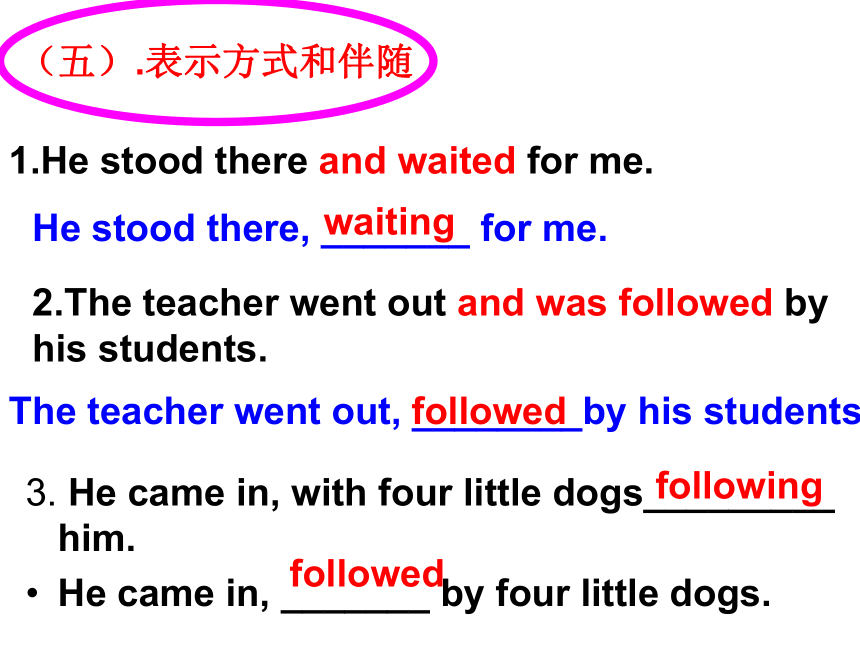
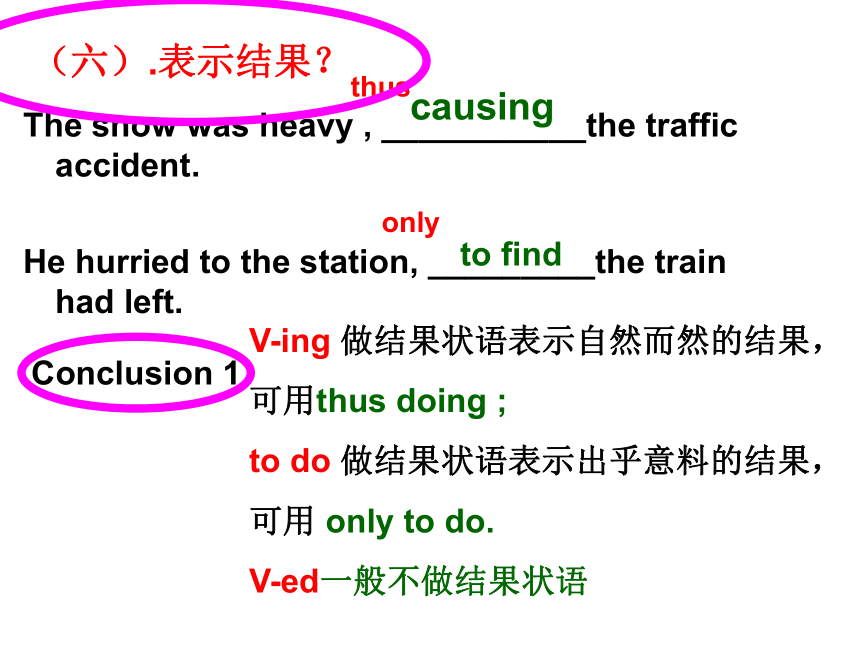
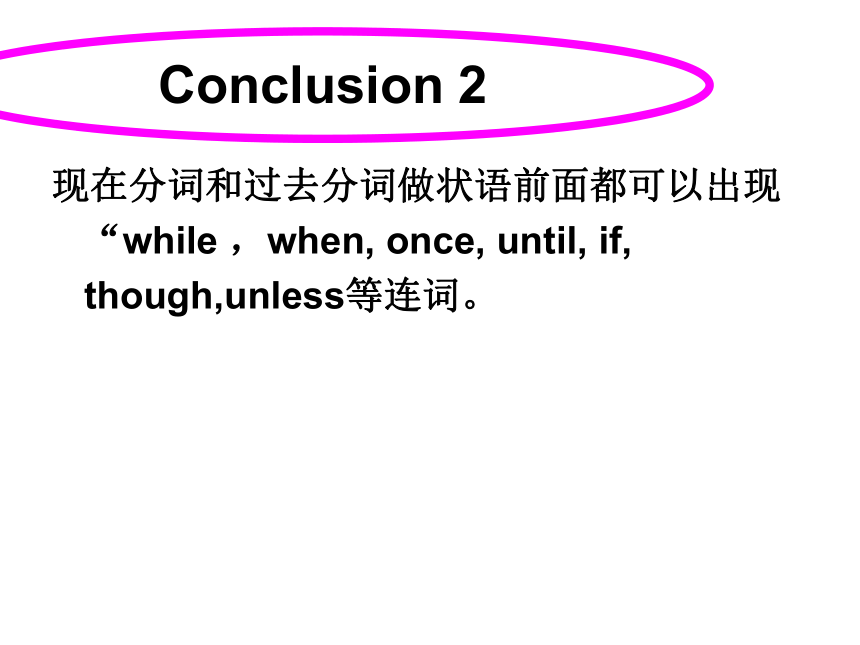
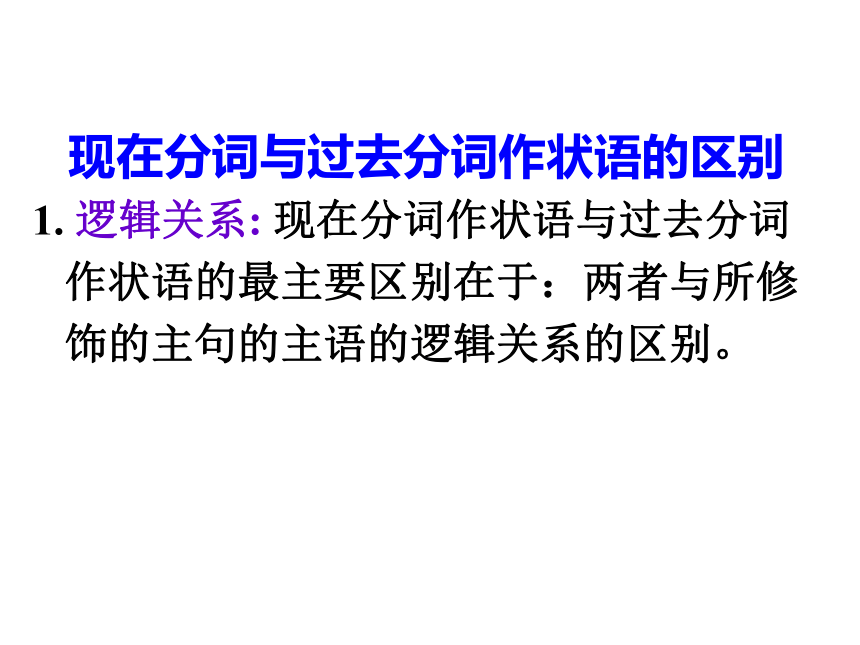
文档简介
(共59张PPT)
Unit 3 Progress
必修二
上教版
2022
Grammar
Participls as adverbials
1、现在分词作状语
2、过去分词作状语
非谓语动词
(分词作状语)
Teaching aims
1.To compare the similarities of v-ing & v-ed as Adverbial;
2.To compare the differences of v-ing & v-ed as adverbial;
3.To put what learned into practice
用分词改写下列状语从句:
1.When the boy heard the news, he cried.
__________ the news, the boy cried.
2.When we asked him about his family, he made no answer.
______ about his family, he made no answer.
Hearing
Asked
S1similarities
(一)、表示时间
the boy
he
3.She didn’t attend the school because she was travelling abroad.
__________ abroad, she didn’t attend the school.
4.Because he was punished by his father, he cried.
_______________by his father,he cried.
Travelling
Punished
(二)、表示原因
S1similarities
5.If you turn left, you’ll find the house.
______ left, you’ll find the house.
6.I won’t go to the party unless I am invited.
I won’t go to the party unless ________.
Turning
invited
(三)、表示条件
7.Though he saw me, he didn’t say hello to me.
_____ me, he didn’t say hello to me.
8.Though he wasn’t invited , he still went to the party.
Not ______, he still went to the party.
Seeing
invited
(四)、表示让步
1.He stood there and waited for me.
He stood there, _______ for me.
2.The teacher went out and was followed by his students.
The teacher went out, ________by his students.
3. He came in, with four little dogs_________ him.
He came in, _______ by four little dogs.
following
followed
(五).表示方式和伴随
followed
waiting
The snow was heavy , ___________the traffic accident.
He hurried to the station, _________the train had left.
causing
to find
only
V-ing 做结果状语表示自然而然的结果,
可用thus doing ;
to do 做结果状语表示出乎意料的结果,
可用 only to do.
V-ed一般不做结果状语
Conclusion 1
thus
(六).表示结果?
现在分词和过去分词做状语前面都可以出现“while ,when, once, until, if, though,unless等连词。
Conclusion 2
现在分词与过去分词作状语的区别
1. 逻辑关系: 现在分词作状语与过去分词作状语的最主要区别在于:两者与所修饰的主句的主语的逻辑关系的区别。
主动关系
被动关系
分词的选取:取决于分词与句子主语的关系:
主动关系,用 doing
被动关系,用 done
Seeing me, he didn’t say hello to me.
Not invited, he still went to the party.
_____for a long time, the book looks old.
1.由于用了很长时间,这本书看上去很旧.
______ the book, I find it useful.
2.在使用的过程中,我发现这本书很有用.
________ (look) at her, he jumped with joy.
________(look) at by her, he jumped with joy.
Used
Using
Looking
Looked
找主语
the book
I
he
he
A.to take B. taking
C. to be taken D. taken
D
B
Everything
they
1._______ everything into consideration,
they ought to have another chance.
2.Everything ______ into consideration,
they ought to have another chance.
找主语
2. 时间概念:
过去分词表示动作已经完成, ,“被动”动作。
现在分词 (having done)
表示动作先于谓语动词发生,“主动”动作;
having been done表示先于谓语动词发生,,“被动”动作;
,若与表示次数的短语或for + 一段时间连用,不能替换成过去分词
现在分词与过去分词作状语的区别
Written in a hurry, this article was not so good.
因为写得匆忙,这篇文章不是很好。
Having been discussed several times, the decision was finally made.
进行了几次讨论后,终于做出了决定。
1. _____ from the top of the tower, the south foot of the mountain is a sea of trees.
Seen B. Seeing
C. Having seen D. To see
[点拨] 答案为A。the south foot of the mountain 与 see 之间是一般的被动关系。
2. _____ around the Water Cube, we were then taken to see the Bird’s Nest for the 2008 Olympic Games.
A. Having shown B. To be shown
C. Having been shown D. To show
[点拨] 答案为C。我们参观鸟巢前已经被带着参观了水立方。
1. Film has a much shorter history, especially when_ such art forms as music and painting.
A. having compared to
B. comparing to
C. compare to
D. compared to
2. _______ with care, one tin will last for six weeks.
A. Use B. Using
C. Used D. To use
4. He got up late and hurried to his office, _________the breakfast untouched.
A. left B. to leave
C. leaving D. having left
5.______to work overtime that evening, I missed a wonderful film.
A.Having been asked B.To ask
C.Having asked D.To be asked
1. ______ into English, the sentence was found to have an entirely different word order.
A. Translating B. Translated
C. To translate D. Having translated
[点拨] 答案为B。句意为“这个句子被翻译为英语时,语序完全不同。”过去分词作时间状语。
2. _____ an important role in a new movie, Andy has got a chance to become famous.
Offer B. Offering
C. Offered D. To offer
[点拨] 答案为C。句意为“因为Andy在一部新电影里被分给一个重要角色,他得到了一个成名的机会。” 过去分词作原因状语。
6.Having finished her project, she was invited by the school to the new students.
A.speaking B.having spoken
C.to speak D.to have spoken
7.The lecture, _____at 7:00 pm last night, was followed by an observation of the moon with telescopes.
A. starting B. being started
C. to start D. to be started
8. Pressed from his parents,and _____that he has wasted too much time, the boy is determined to stop playing video games.
A. realizing B. realized
C. to realize D. being realized
9. " It's such a nice place," Mother said as she sat at the table______ for customers.
A, to be reserved B, having reserved
C, reserving D, reserved
10. ______ into English, the sentence was found to have an entirely different word order.
A. Translating B. Translated
C. To translate D. Having translated
[点拨] 答案为B。句意为“这个句子被翻译为英语时,语序完全不同。”过去分词作时间状语。
11. _____ an important role in a new movie, Andy has got a chance to become famous.
Offer B. Offering
C. Offered D. To offer
[点拨] 答案为C。句意为“因为Andy在一部新电影里被分给一个重要角色,他得到了一个成名的机会。” 过去分词作原因状语。
12. The experiment shows that proper amounts of exercise, if _____ regularly, can improve our health.
A. being carried out B. carrying out
C. carried out D. to carry out
[点拨] 答案为C。if carried out regularly的完整形式是 if exercise is carried out regularly。
13. — Who should be responsible for the accident
— The boss, not the workers. They just carried out the order _____.
A. as told B. as are told
C. as telling D. as they told
[点拨] 答案为A。as told 的完整形式是 as they were told。
summary
1.To compare the similarities of v-ing & v-ed as Adverbial;
2.To compare the differences of v-ing & v-ed as adverbial;
3.Put what learned into practice
考点三:“连词 + 过去分词”作状语
1. The experiment shows that proper amounts of exercise, if _____ regularly, can improve our health.
A. being carried out B. carrying out
C. carried out D. to carry out
[点拨] 答案为C。if carried out regularly的完整形式是 if exercise is carried out regularly。
2. — Who should be responsible for the accident
— The boss, not the workers. They just carried out the order _____.
A. as told B. as are told
C. as telling D. as they told
[点拨] 答案为A。as told 的完整形式是 as they were told。
独立主格结构
一、独立主格结构的构成形式
1. 名/代(逻辑主语)+分词(doing/done)
1.Weather ____, we will go out for a walk.
A.permits B.permitted
C.permitting D.to permit
=If weather permits,we will....
2._________no bus, we had to walk home.
A.There being B.Being
C.Having been D.There was
A
= Because there was no bus, we had to walk home.
C
The children went home from the grammar school, their lessons _____ for the day.
A. finishing B. finished
C. had finished D. were finished
[点拨] 答案为B。lessons为finish的主语,与句子的主语children不一致,且lessons与finish之间是被动关系。
3._________, the train started.
A.The signal given
B.Giving the signal
C.The signal being given
D.The signal giving
=After the signal was given,the train started.
A
4._________, the text became easier for us to learn.
A.Explaining new words
B.New words explained
C.Being explained new words
D.Having explained new words
B
= When new words were explained , the text became easier for us to learn.
2 .名/代(逻辑主语)+不定式(to do)
The exam______ tomorrow, I can't go to the cinema tonight.
A.to hold B.being held
C.to be held D.having been held
=Because the exam is to be held tomorrow , I can't go to the cinema.
C
3.名/代(逻辑主语)+形/副
(名/代+being +形/副, being可省略)
1.Our lessons____, we went to play football.
A.being over B.over
C.were over D.A and B
=When our lessons were over, we went to play football.
D
2._________, you can wait a while.
A.The play being still on
B.The play still on
C Being still on the play D.A and B
3._________, so you can wait a while
A.The play is still on
B.The play being still on
C.As the play is still on
D.The play still on
D
A
4.名/代(逻辑主语)+介词短语
with+名+介+形物主代词+名
The teacher came in, with a book in his hand.
名+介+名
The teacher came in , book in hand.
B
1.He left the office, __________.
A.tears being in eyes B.tears in eyes C.being tears in eyes
D.with tears being in eyes
1.She lay against the wall, the sun ___ upon her.
A.shine B.was shining C.shining D.shines
2.Winter____, it is getting colder and colder.
A.comes B.came
C.to come D.having come
C
D
注意: 在be+v-ed+介词结构中,如果此结构出现在做状语的从句中,可以看做是省略了主语和be。常见短语有:
be faced with/ be dressed in/
be seated in/ be lost in/ be absorbed in/
be located in/ be devoted to/ be equipped with/
be connected with/be determined to/
be compared with
Lost in thought, he almost ran into the
car in front of him.
Because he was lost in thought, he almost
ran into the car in front of him.
原因
__________ to reading the novel in the
study, he didn't notice me enter .(devote)
Devoted
________ with the difficulties, the
government has been trying the best.(face)
Faced
小结
as adverbials
as adverbials
continuing
past action
active
passive
verb-ing
verb-ed
as adverbials
时间状语
Asked about his address, the boy didn’t respond.
=When he was asked about his address,the boy didn’t respond.
Walking in the park,she saw an old friend.
=When/While (she was) walking in the park,she saw an old friend.
as adverbials
原因状语
Annoyed at the decision,he refused to attend the meeting.
=As he was annoyed at the decision,he refused to attend the meeting.
Being ill,he couldn’t go to school.
=As he was ill,he couldn’t go to school.
as adverbials
条件状语
Given more time ,we could have better work.
=If they were given more time, we could have better work.
Working hard,you’ll make great progress.
=If you work hard,you’ll make great progress.
as adverbials
结果状语
He fell off a tall tree, his leg broken.
=He fell off a tall tree, and his leg was broken.
He was caught in the rain,thus making himself catch a cold.
=He was caught in the rain,which made himself catch a cold.
I hurried to school,only to find it was Sunday.
as adverbials
让步状语
Trained ten hours a day, he will still be a fool.
=Even if he was trained ten hours a day, he will still be a fool.
Though knowing all this,they made me pay for the damage.
=Though they knew all this,they made me pay for the damage.
as adverbials
方式状语
Mary sat by the window of the classroom,reading a book.
=Mary sat by the window of the classroom and was reading a book.
as adverbials
伴随状语
Followed by a group of students,the teacher entered the classroom.
=The teacher entered the classroom and he was followed by a group of students.
Following a group of students,the teacher entered the classroom.
=The teacher entered the classroom and he followed by a group of students.
as adverbials
Though warned of the storm,the farmers were still working in the fields.
While admitting he was involved in the crime, he denied taking part in it.
过去分词(短语)作状语时,前面有时可以加上when,if,while,though,even if,until,unless等连词。需要注意的是,省略的主语必须和主句的主语相同或为it。
为强调动词-ing形式表达的意义,可在其前加上各种连词。例如,加上when,while,强调与谓语动词同时发生;加上before,after,强调动作先后发生;加上thus,强调结果;加上(al)though,强调让步等。
as adverbials
Walking in the street,I met an old friend of mine.
Having finished the letter,he went to post it.
Having been shown around the factory,they were very happy.
Having finished his homework,he went to bed.
Not knowing this,he didn’t come.
Not having made full preparations,we put off the sports meeting.
as adverbials
_______ from the hill, you will find the city looks like a big garden.
_______ from the hill, the city looks like a big garden.
Seeing
Seen
active
passive
as adverbials
________ for a long time, the book looks old.
________ the book, I find it useful.
________ at her, he jumped with joy. (look)
________ at by her, he jumped with joy. (look)
________ with his room, mine is smaller.(compare)
________ with his room, I found mine smaller.(compare)
Compared
Used
Using
Looking
Looked
Comparing
Byebye
Unit 3 Progress
必修二
上教版
2022
Grammar
Participls as adverbials
1、现在分词作状语
2、过去分词作状语
非谓语动词
(分词作状语)
Teaching aims
1.To compare the similarities of v-ing & v-ed as Adverbial;
2.To compare the differences of v-ing & v-ed as adverbial;
3.To put what learned into practice
用分词改写下列状语从句:
1.When the boy heard the news, he cried.
__________ the news, the boy cried.
2.When we asked him about his family, he made no answer.
______ about his family, he made no answer.
Hearing
Asked
S1similarities
(一)、表示时间
the boy
he
3.She didn’t attend the school because she was travelling abroad.
__________ abroad, she didn’t attend the school.
4.Because he was punished by his father, he cried.
_______________by his father,he cried.
Travelling
Punished
(二)、表示原因
S1similarities
5.If you turn left, you’ll find the house.
______ left, you’ll find the house.
6.I won’t go to the party unless I am invited.
I won’t go to the party unless ________.
Turning
invited
(三)、表示条件
7.Though he saw me, he didn’t say hello to me.
_____ me, he didn’t say hello to me.
8.Though he wasn’t invited , he still went to the party.
Not ______, he still went to the party.
Seeing
invited
(四)、表示让步
1.He stood there and waited for me.
He stood there, _______ for me.
2.The teacher went out and was followed by his students.
The teacher went out, ________by his students.
3. He came in, with four little dogs_________ him.
He came in, _______ by four little dogs.
following
followed
(五).表示方式和伴随
followed
waiting
The snow was heavy , ___________the traffic accident.
He hurried to the station, _________the train had left.
causing
to find
only
V-ing 做结果状语表示自然而然的结果,
可用thus doing ;
to do 做结果状语表示出乎意料的结果,
可用 only to do.
V-ed一般不做结果状语
Conclusion 1
thus
(六).表示结果?
现在分词和过去分词做状语前面都可以出现“while ,when, once, until, if, though,unless等连词。
Conclusion 2
现在分词与过去分词作状语的区别
1. 逻辑关系: 现在分词作状语与过去分词作状语的最主要区别在于:两者与所修饰的主句的主语的逻辑关系的区别。
主动关系
被动关系
分词的选取:取决于分词与句子主语的关系:
主动关系,用 doing
被动关系,用 done
Seeing me, he didn’t say hello to me.
Not invited, he still went to the party.
_____for a long time, the book looks old.
1.由于用了很长时间,这本书看上去很旧.
______ the book, I find it useful.
2.在使用的过程中,我发现这本书很有用.
________ (look) at her, he jumped with joy.
________(look) at by her, he jumped with joy.
Used
Using
Looking
Looked
找主语
the book
I
he
he
A.to take B. taking
C. to be taken D. taken
D
B
Everything
they
1._______ everything into consideration,
they ought to have another chance.
2.Everything ______ into consideration,
they ought to have another chance.
找主语
2. 时间概念:
过去分词表示动作已经完成, ,“被动”动作。
现在分词 (having done)
表示动作先于谓语动词发生,“主动”动作;
having been done表示先于谓语动词发生,,“被动”动作;
,若与表示次数的短语或for + 一段时间连用,不能替换成过去分词
现在分词与过去分词作状语的区别
Written in a hurry, this article was not so good.
因为写得匆忙,这篇文章不是很好。
Having been discussed several times, the decision was finally made.
进行了几次讨论后,终于做出了决定。
1. _____ from the top of the tower, the south foot of the mountain is a sea of trees.
Seen B. Seeing
C. Having seen D. To see
[点拨] 答案为A。the south foot of the mountain 与 see 之间是一般的被动关系。
2. _____ around the Water Cube, we were then taken to see the Bird’s Nest for the 2008 Olympic Games.
A. Having shown B. To be shown
C. Having been shown D. To show
[点拨] 答案为C。我们参观鸟巢前已经被带着参观了水立方。
1. Film has a much shorter history, especially when_ such art forms as music and painting.
A. having compared to
B. comparing to
C. compare to
D. compared to
2. _______ with care, one tin will last for six weeks.
A. Use B. Using
C. Used D. To use
4. He got up late and hurried to his office, _________the breakfast untouched.
A. left B. to leave
C. leaving D. having left
5.______to work overtime that evening, I missed a wonderful film.
A.Having been asked B.To ask
C.Having asked D.To be asked
1. ______ into English, the sentence was found to have an entirely different word order.
A. Translating B. Translated
C. To translate D. Having translated
[点拨] 答案为B。句意为“这个句子被翻译为英语时,语序完全不同。”过去分词作时间状语。
2. _____ an important role in a new movie, Andy has got a chance to become famous.
Offer B. Offering
C. Offered D. To offer
[点拨] 答案为C。句意为“因为Andy在一部新电影里被分给一个重要角色,他得到了一个成名的机会。” 过去分词作原因状语。
6.Having finished her project, she was invited by the school to the new students.
A.speaking B.having spoken
C.to speak D.to have spoken
7.The lecture, _____at 7:00 pm last night, was followed by an observation of the moon with telescopes.
A. starting B. being started
C. to start D. to be started
8. Pressed from his parents,and _____that he has wasted too much time, the boy is determined to stop playing video games.
A. realizing B. realized
C. to realize D. being realized
9. " It's such a nice place," Mother said as she sat at the table______ for customers.
A, to be reserved B, having reserved
C, reserving D, reserved
10. ______ into English, the sentence was found to have an entirely different word order.
A. Translating B. Translated
C. To translate D. Having translated
[点拨] 答案为B。句意为“这个句子被翻译为英语时,语序完全不同。”过去分词作时间状语。
11. _____ an important role in a new movie, Andy has got a chance to become famous.
Offer B. Offering
C. Offered D. To offer
[点拨] 答案为C。句意为“因为Andy在一部新电影里被分给一个重要角色,他得到了一个成名的机会。” 过去分词作原因状语。
12. The experiment shows that proper amounts of exercise, if _____ regularly, can improve our health.
A. being carried out B. carrying out
C. carried out D. to carry out
[点拨] 答案为C。if carried out regularly的完整形式是 if exercise is carried out regularly。
13. — Who should be responsible for the accident
— The boss, not the workers. They just carried out the order _____.
A. as told B. as are told
C. as telling D. as they told
[点拨] 答案为A。as told 的完整形式是 as they were told。
summary
1.To compare the similarities of v-ing & v-ed as Adverbial;
2.To compare the differences of v-ing & v-ed as adverbial;
3.Put what learned into practice
考点三:“连词 + 过去分词”作状语
1. The experiment shows that proper amounts of exercise, if _____ regularly, can improve our health.
A. being carried out B. carrying out
C. carried out D. to carry out
[点拨] 答案为C。if carried out regularly的完整形式是 if exercise is carried out regularly。
2. — Who should be responsible for the accident
— The boss, not the workers. They just carried out the order _____.
A. as told B. as are told
C. as telling D. as they told
[点拨] 答案为A。as told 的完整形式是 as they were told。
独立主格结构
一、独立主格结构的构成形式
1. 名/代(逻辑主语)+分词(doing/done)
1.Weather ____, we will go out for a walk.
A.permits B.permitted
C.permitting D.to permit
=If weather permits,we will....
2._________no bus, we had to walk home.
A.There being B.Being
C.Having been D.There was
A
= Because there was no bus, we had to walk home.
C
The children went home from the grammar school, their lessons _____ for the day.
A. finishing B. finished
C. had finished D. were finished
[点拨] 答案为B。lessons为finish的主语,与句子的主语children不一致,且lessons与finish之间是被动关系。
3._________, the train started.
A.The signal given
B.Giving the signal
C.The signal being given
D.The signal giving
=After the signal was given,the train started.
A
4._________, the text became easier for us to learn.
A.Explaining new words
B.New words explained
C.Being explained new words
D.Having explained new words
B
= When new words were explained , the text became easier for us to learn.
2 .名/代(逻辑主语)+不定式(to do)
The exam______ tomorrow, I can't go to the cinema tonight.
A.to hold B.being held
C.to be held D.having been held
=Because the exam is to be held tomorrow , I can't go to the cinema.
C
3.名/代(逻辑主语)+形/副
(名/代+being +形/副, being可省略)
1.Our lessons____, we went to play football.
A.being over B.over
C.were over D.A and B
=When our lessons were over, we went to play football.
D
2._________, you can wait a while.
A.The play being still on
B.The play still on
C Being still on the play D.A and B
3._________, so you can wait a while
A.The play is still on
B.The play being still on
C.As the play is still on
D.The play still on
D
A
4.名/代(逻辑主语)+介词短语
with+名+介+形物主代词+名
The teacher came in, with a book in his hand.
名+介+名
The teacher came in , book in hand.
B
1.He left the office, __________.
A.tears being in eyes B.tears in eyes C.being tears in eyes
D.with tears being in eyes
1.She lay against the wall, the sun ___ upon her.
A.shine B.was shining C.shining D.shines
2.Winter____, it is getting colder and colder.
A.comes B.came
C.to come D.having come
C
D
注意: 在be+v-ed+介词结构中,如果此结构出现在做状语的从句中,可以看做是省略了主语和be。常见短语有:
be faced with/ be dressed in/
be seated in/ be lost in/ be absorbed in/
be located in/ be devoted to/ be equipped with/
be connected with/be determined to/
be compared with
Lost in thought, he almost ran into the
car in front of him.
Because he was lost in thought, he almost
ran into the car in front of him.
原因
__________ to reading the novel in the
study, he didn't notice me enter .(devote)
Devoted
________ with the difficulties, the
government has been trying the best.(face)
Faced
小结
as adverbials
as adverbials
continuing
past action
active
passive
verb-ing
verb-ed
as adverbials
时间状语
Asked about his address, the boy didn’t respond.
=When he was asked about his address,the boy didn’t respond.
Walking in the park,she saw an old friend.
=When/While (she was) walking in the park,she saw an old friend.
as adverbials
原因状语
Annoyed at the decision,he refused to attend the meeting.
=As he was annoyed at the decision,he refused to attend the meeting.
Being ill,he couldn’t go to school.
=As he was ill,he couldn’t go to school.
as adverbials
条件状语
Given more time ,we could have better work.
=If they were given more time, we could have better work.
Working hard,you’ll make great progress.
=If you work hard,you’ll make great progress.
as adverbials
结果状语
He fell off a tall tree, his leg broken.
=He fell off a tall tree, and his leg was broken.
He was caught in the rain,thus making himself catch a cold.
=He was caught in the rain,which made himself catch a cold.
I hurried to school,only to find it was Sunday.
as adverbials
让步状语
Trained ten hours a day, he will still be a fool.
=Even if he was trained ten hours a day, he will still be a fool.
Though knowing all this,they made me pay for the damage.
=Though they knew all this,they made me pay for the damage.
as adverbials
方式状语
Mary sat by the window of the classroom,reading a book.
=Mary sat by the window of the classroom and was reading a book.
as adverbials
伴随状语
Followed by a group of students,the teacher entered the classroom.
=The teacher entered the classroom and he was followed by a group of students.
Following a group of students,the teacher entered the classroom.
=The teacher entered the classroom and he followed by a group of students.
as adverbials
Though warned of the storm,the farmers were still working in the fields.
While admitting he was involved in the crime, he denied taking part in it.
过去分词(短语)作状语时,前面有时可以加上when,if,while,though,even if,until,unless等连词。需要注意的是,省略的主语必须和主句的主语相同或为it。
为强调动词-ing形式表达的意义,可在其前加上各种连词。例如,加上when,while,强调与谓语动词同时发生;加上before,after,强调动作先后发生;加上thus,强调结果;加上(al)though,强调让步等。
as adverbials
Walking in the street,I met an old friend of mine.
Having finished the letter,he went to post it.
Having been shown around the factory,they were very happy.
Having finished his homework,he went to bed.
Not knowing this,he didn’t come.
Not having made full preparations,we put off the sports meeting.
as adverbials
_______ from the hill, you will find the city looks like a big garden.
_______ from the hill, the city looks like a big garden.
Seeing
Seen
active
passive
as adverbials
________ for a long time, the book looks old.
________ the book, I find it useful.
________ at her, he jumped with joy. (look)
________ at by her, he jumped with joy. (look)
________ with his room, mine is smaller.(compare)
________ with his room, I found mine smaller.(compare)
Compared
Used
Using
Looking
Looked
Comparing
Byebye
